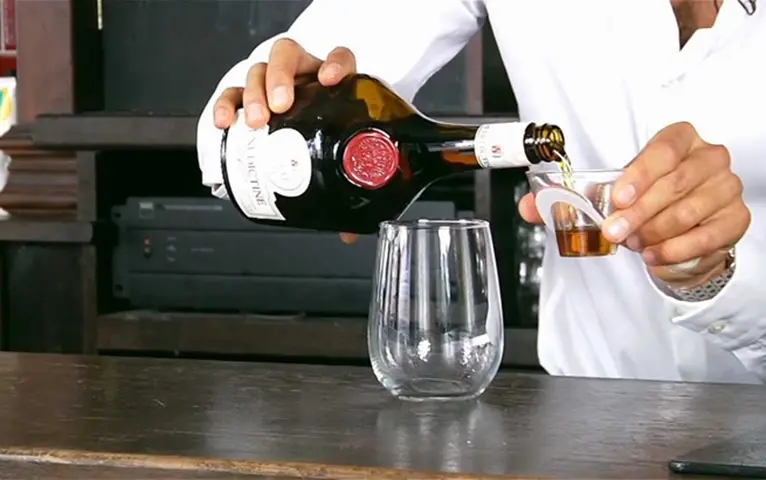Benedictine liqueur is a popular and intriguing spirit with a rich history. This herbal liqueur, known for its complex flavor profile, is enjoyed by many around the world. This article will delve into the origins, ingredients, and production process of Benedictine liqueur. We’ll also explore its uses and how it fits into the world of spirits.
History of Benedictine Liqueur
Benedictine liqueur has a storied past dating back to the 16th century. It was created by Dom Bernardo Vincelli, a Benedictine monk, in the Abbey of Fécamp in Normandy, France. The recipe was a closely guarded secret and was nearly lost during the French Revolution. In the 19th century, Alexandre Le Grand, a wine merchant, rediscovered the recipe and began producing the liqueur commercially. Today, Benedictine is produced by Bacardi Limited.
The Secret Recipe
The exact recipe of Benedictine liqueur remains a closely guarded secret, known to only a few people. However, it is known to contain 27 different herbs and spices. These ingredients are blended with a base of brandy, resulting in a unique and aromatic liqueur. While the specific herbs and spices are not disclosed, some of the key ingredients are known.
Key Ingredients
Angelica: This herb has a distinct, slightly bitter taste. It is used for its aromatic properties.
Hyssop: A member of the mint family, hyssop adds a minty and slightly bitter flavor.
Juniper: Known for its pine-like flavor, juniper adds a fresh and slightly resinous taste.
Myrrh: A resin with a warm, aromatic quality, myrrh contributes to the complexity of Benedictine.
Saffron: This expensive spice adds a subtle, earthy flavor and a golden color to the liqueur.
Cinnamon: Known for its warm, sweet taste, cinnamon adds depth and richness.
Honey: Honey is used to sweeten the liqueur, balancing the bitter and aromatic herbs.
Lemon Balm: This herb adds a citrusy, fresh note to the liqueur.
Aloe: Aloe contributes to the bitterness and is known for its medicinal properties.
Coriander: This spice adds a citrusy and slightly spicy flavor.
Production Process
The production of Benedictine liqueur involves several steps. The herbs and spices are macerated in a base of brandy. This process extracts the flavors and aromas from the ingredients. The mixture is then distilled, creating a concentrated herbal essence. The distillate is aged in oak barrels for several months to develop its flavors. Finally, honey and additional brandy are added to create the final product. The liqueur is then filtered and bottled.
Tasting Notes
Benedictine liqueur is known for its complex flavor profile. It has a rich, golden color and a thick, syrupy consistency. On the nose, it offers a bouquet of herbs, spices, and citrus. The taste is a harmonious blend of sweet, bitter, and aromatic flavors. Notes of honey, cinnamon, and citrus are balanced by the bitterness of herbs like angelica and aloe. The finish is long and warming, with a lingering sweetness.
Uses of Benedictine Liqueur
Benedictine liqueur can be enjoyed in various ways. It is often sipped neat or on the rocks as a digestif. Its complex flavor profile makes it a versatile ingredient in cocktails. Some popular cocktails featuring Benedictine include:
B&B: A classic cocktail made with equal parts Benedictine and brandy.
Vieux Carré: A New Orleans cocktail made with rye whiskey, cognac, sweet vermouth, Benedictine, and bitters.
Singapore Sling: A tropical cocktail made with gin, cherry liqueur, Benedictine, lime juice, and soda water.
Monk’s Dream: A cocktail made with Benedictine, gin, dry vermouth, and orange bitters.
See Also: B&B Liqueur: The Perfect Blend of Benedictine and Brandy
Benedictine in Cooking and Baking
Benedictine liqueur is also used in cooking and baking. Its complex flavors can enhance both sweet and savory dishes. It is often used in sauces, marinades, and desserts. Some recipes include Benedictine in cakes, pastries, and ice creams.
Health Benefits and Considerations
Like all alcoholic beverages, Benedictine should be consumed in moderation. It has been said to have digestive benefits, which is why it is often consumed as a digestif. The herbs and spices used in its production are known for their medicinal properties. However, excessive consumption can lead to negative health effects.
Storing Benedictine Liqueur
Benedictine liqueur should be stored in a cool, dark place, away from direct sunlight. Once opened, it can be kept for an extended period without significant loss of quality. The high sugar content helps preserve its flavors.
Cultural Significance
Benedictine liqueur holds a special place in French culture. It is more than just a drink; it represents a piece of history and tradition. The Abbey of Fécamp, where the recipe originated, is now a museum dedicated to the history of Benedictine. Visitors can learn about the liqueur’s history and production process.
How to Choose a Good Benedictine Liqueur
When selecting Benedictine, consider the following factors:
Brand: Benedictine is produced by Bacardi Limited, ensuring consistent quality.
Packaging: Look for bottles that are well-sealed and have clear labels.
Price: While price can be an indicator of quality, there is only one brand of Benedictine, so prices are relatively consistent.
Conclusion
Benedictine liqueur is a unique and versatile spirit with a rich history and complex flavor profile. Made from a secret blend of 27 herbs and spices, it offers a harmonious blend of sweet, bitter, and aromatic flavors. Whether enjoyed neat, in a cocktail, or used in cooking, Benedictine liqueur brings a touch of sophistication and depth to any occasion. By understanding its ingredients, production process, and cultural significance, one can fully appreciate what Benedictine liqueur has to offer.


